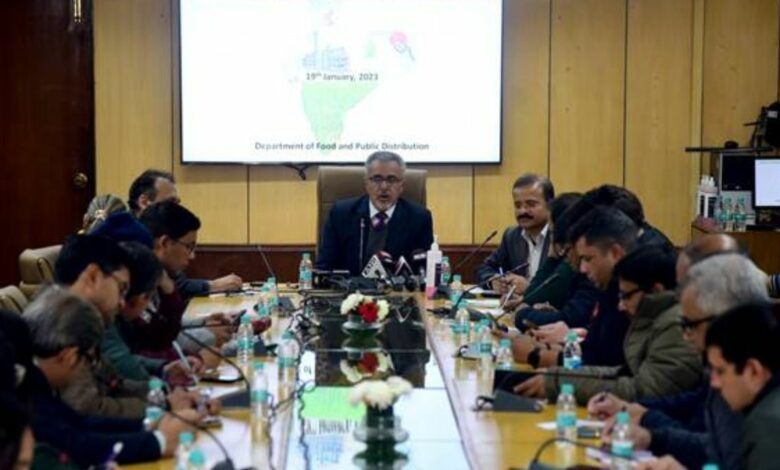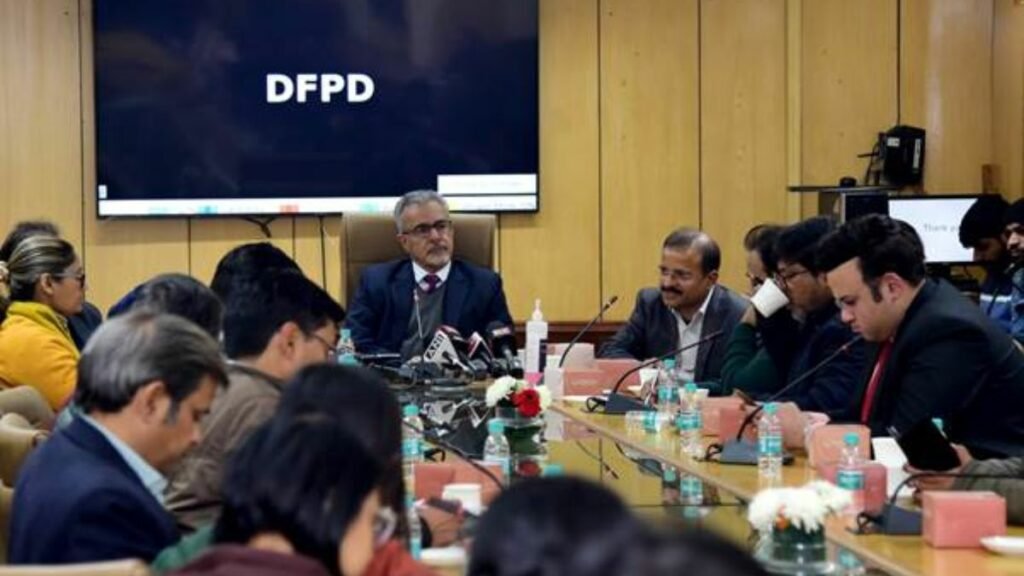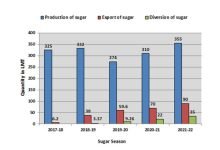More than 5000 Lakh Metric Tons (LMT) of sugarcane produced in Sugar Season 2021-22

The sugar sector is now self-sufficient with no subsidy
The year 2021-22 has proven to be a watershed season for Indian Sugar Sector. All records of sugarcane production, sugar production, sugar exports, cane procured, cane dues paid and ethanol production was made during the season. During the season, record more than 5000 Lakh Metric Tons (LMT) of sugarcane was produced in the country out of which about 3574 LMT of sugarcane was crushed by sugar mills to produce about 394 Lakh MT of sugar (Sucrose) out of which 36 lakh MT sugar was diverted to ethanol production and 359 LMT sugar was produced by sugar mills.
India has emerged as the world’s largest producer and consumer of sugar as well as the world’s 2nd largest exporter of sugar after Brazil, in Sugar Season (Oct-Sep) 2021-22.
In every sugaring season, the production of sugar is around 320-360 Lakh Metric Tons (LMT) as against the domestic consumption of 260-280 LMT which results in a huge carry-over stock of sugar with mills. Due to the excess availability of sugar in the country, the ex-mill prices of sugar remain subdued resulting in cash loss to sugar mills. This excess stock of about 60-80 LMT also leads to the blockage of funds & affects the liquidity of sugar mills resulting in the accumulation of cane price arrears.
With a view to preventing cash loss to sugar mills caused due to subdued sugar prices, the Government of India in June, 2018 introduced the concept of Minimum Selling Price (MSP) of sugar & fixed MSP of sugar at Rs. 29/ kg which was revised to Rs. 31/ kg w.e.f 14.02.2019.
The timely intervention of the Central Government in the last 5 years has been crucial in building the sugar sector step-by-step from taking them out of financial distress in 2018-19 to the stage of self-sufficiency in 2021-22. It is a remarkable achievement that during SS 2021-22, sugar mills procured sugarcane worth more than ₹ 1.18 lakh crore and released payment of more than 1.15 lakh crore for the season with no financial assistance (subsidy) from the Government of India. Thus, cane dues for sugar season 2021-22 are less than ₹ 2,300 crores indicating that 98% of cane dues have already been cleared. It is also noteworthy that for SS 2020-21, about 99.98% of cane dues are cleared.
As a long-term measure to enable the sugar sector to grow as self-sufficient, the Central Government has been encouraging sugar mills to divert sugar to ethanol and also to export surplus sugar so that sugar mills may make payment of cane dues to farmers in time and also mills may have better financial conditions to continue their operations. With success in both measures, the Sugar sector is now self-sufficient with no subsidy for the sector since SS 2021-22.
Growth of ethanol as biofuel sector in last 5 years has amply supported the sugar sector as the diversion of sugar to ethanol has led to better financial positions of sugar mills due to faster payments, reduced working capital requirements and less blockage of funds due to less surplus sugar with mills. During 2021-22, revenue of more than ₹ 20,000 crore has been made by sugar mills/distilleries from the sale of ethanol which has also played its role in early clearance of cane dues of farmers.
During 2021-22, the revenue of more than ₹ 20,000 crores was made by sugar mills/distilleries from the sale of ethanol

The ethanol production capacity of molasses/sugar-based distilleries has increased to 683 crore litres per annum and the progress is still continuing to meet targets of 20% blending by 2025 under the Ethanol Blending with Petrol (EBP) Programme. In the new season, the diversion of sugar to ethanol is expected to increase from 36 LMT to 50 LMT which would generate revenue for sugar mills amounting to about ₹ 25,000 crores. The Ethanol Blending Programme has saved foreign exchange as well as strengthened the energy security of the country. By 2025, it is targeted to divert more than 60 LMT of excess sugar to ethanol, which would solve the problem of high inventories of sugar, and improve the liquidity of mills thereby helping in the timely payment of cane dues of farmers and will also generate employment opportunities in rural areas.
To achieve blending targets, the Government is encouraging sugar mills and distilleries to enhance their distillation capacities for which the Government is facilitating them to avail loans from banks for which interest subvention @ 6% or 50% of the interest charged by the banks whichever is lower is being borne by Government. This will bring an investment of about ₹ 41,000 crores.
DFPD has also opened a window for 12 months w.e.f 22.04.2022 for inviting applications from Project Proponents for enhancement of their existing ethanol distillation capacity or to set up a new distillery for producing 1st Generation (1G) ethanol from feedstocks such as cereals (rice, wheat, barley, corn & sorghum), sugarcane (including sugar, sugar syrup, sugarcane juice, B-heavy molasses, C-heavy molasses), sugar beet etc. In the past 4 years, loans of about ₹ 19,495 crores have been sanctioned to 233 project proponents out of which loans of about ₹ 9970 cr have been disbursed to 203 project proponents.
Another shining highlight of the season is the highest exports of about 110 LMT that too with no financial assistance, which was being extended upto 2020-21. Supportive international prices and Indian Government Policy led to this feat of the Indian Sugar Industry. These exports earned foreign currency of about ₹ 40,000 crores for the country. In the current sugar season 2022-23, about 60 LMT export quotas have been allocated to all sugar mills, out of which about 30 LMT have been lifted from sugar mills for export till 18.01.2023.
Ultimately, at the end of SS 2021-22, the optimum closing balance of 60 LMT was achieved which is essential to meet domestic requirements for 2.5 months. The diversion of sugar to ethanol and exports led to the unlocking of the value chain of the whole industry as well as improved financial conditions of sugar mills leading to more optional mills in the ensuing season.
Another highlight is stability in domestic sugar prices. Despite record-high international sugar prices, domestic ex-mill prices of sugar are stable and in the range of ₹ 32 -35/kg. The average retail price of sugar in the country is about ₹ 41.50/ kg & is likely to remain in the range of ₹37-43/kg in the coming months which is not a cause for worry. It is the outcome of Government policies that sugar is not ‘bitter’ in the country and still sweet.
Disclaimer: This is an official press release by PIB.








